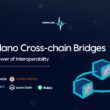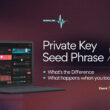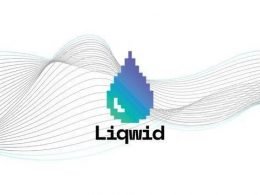
Non-fungible tokens (NFTs) are among the essential utilities in the blockchain ecosystem. These digital assets provide their users with authenticity, records of ownership and can be sold. When it comes to Cardano, counterfeit NFTs are a growing problem. With over 80% of NFTs minted on the world’s largest marketplace being plagiarized, fake, or spam, ground-breaking innovations targeted toward this problem have emerged. One is the Argus, which uses AI to identify NFT counterfeits on Cardano. By assuring NFT collectors of originality, Argus helps build trust and goodwill in NFT marketplaces.
The number of minted NFTs is ever-growing and provides more opportunities for bad actors. In blockchains like Ethereum, NFT counterfeit solutions like Optic have amassed billions of dollars from prominent VCs based on their value addition to the EVM ecosystem. Regarding the Cardano family, Argus is the sole dedicated solution for protecting its ecosystem. To enhance the Cardano ecosystem, a team of Cardano enthusiasts has presented a Fund 10 proposal on Project Catalyst. They seek $26 750 net of funding to develop a SaaS Argus adoption model to democratize access to robust counterfeit detection.
The Team Behind the Project
Behind the project are players from the ArgusNFT and Plutus.Art teams. Drawing from diverse skills and backgrounds, the members form a well-balanced unit with expertise in artificial intelligence (AI), blockchain development, web development, legal advisory, NFTs, and SaaS. Contributors from the ArgusNFT team are Giovanni Garguilo and Antony Capitan; from the Plutus.Art team is Chadi Nassar and Stale.
Giovani, a cofounder of ArgusNFT, is a principal engineer with over 15 years of commercial expertise. Giovani has experience with machine learning, cloud, and distributed systems. He’s also a stake pool operator and an open-source developer. Next, Antony cofounded ArgusNFT, bringing seven years of business development and 15 of sales, marketing, and project management. He has also advised early-stage Cardano projects. Chadi, a cofounder of Plutus.Art NFT marketplace brings rich experience as a leading Cardano NFT artist and content creator. And then there’s Stale, an expert chief technology officer and co-founder of Plutus.Art.
An Overview of the Argus API SaaS Integration Model Roadmap
According to Antony, the development focus will circle on extending the functionality of Argus through an open-source, zero-subscription model that seamlessly integrates with NFT marketplaces. To bring the project to life, the team follows a clear plan involving Plutus.Art integration design, API development and testing, beta testing and feedback, integration with Plutus.Art, licensing the framework and documentation, marketing/outreach. Once each step is complete, each level will have an accompanying outcome.
In the Plutus.Art integration design phase, the Argus notification interface will be designed, and the API’s front and back end will be developed. At completion, open-source code for integrating Argus API will be live. All Cardano NFT platforms will be open to try. In the API development and testing stage, activities involve testing the API’s functionality, security, usability, compatibility, and scalability through various tools. By the end of this phase, the API documentation will be available, covering all specification aspects, features, usage, and examples. Additionally, the API will provide personalized NFT recommendations based on wallet data and connected external platforms.
At the Beta testing and feedback milestone, the focus is on validating the Argus API’s effectiveness in identifying counterfeit NFTs and improving it based on users’ feedback. Next in line, the Beta version is integrated with Plutus.Art. At this time, more feedback is collected from Plutus.Art users to help improve the API and its NFT suggestions. Additionally, other Cardano NFT Marketplaces will follow suit with the integration with Plutus as a proof of concept.
Fast forward to the licensing stage, an attorney will help draft a licensing framework and API agreement allowing other platforms to integrate Argus AI at minimal costs. By the end of this stage, the attorney will have ratified that the Argus API meets legal and ethical standards for SaaS products and services. And in the marketing and outreach (the final phase), activities encompass promoting the Argus API to the Cardano community and reaching out to other Cardano NFT platforms, offering them licenses to integrate the API.
The team will also provide support to all interested platforms. By the end of all milestones, you’d expect at least 5 Cardano NFT platforms to show interest in the API. Remember that updates will be rolled out based on user feedback and technological advancements. A bold move to protect Cardano’s NFTs space.
Project Budget and Timelines
The Argus AI SaaS model for NFT counterfeit protection is a part of the Fund 10 development and infrastructure enhancements submitted to Project Catalyst. The team requests $ 26,750 (84,040 ADA) in the proposal to bring the project to life. The funds will be split; Plutus.Art web development ($12,000), ArgusNFT technical support ($2,000), SaaS attorney ($5,000), marketing operations ($3,500), project management ($2,000), API documentation ($1,500), and reporting $750. Here’s a quick rundown of the project stages and their estimated delivery time.
- Phase 1: Plutus.Art integration design – 1 Month
- Phase 2: API Development and testing – 2 Months
- Phase 3: Beta testing and feedback – 1 Month
- Phase 4: Integration with Plutus.Art – 2 months
- Phase 5: Licensing framework and documentation – 1 month
- Phase 6: Marketing and Outreach – 1 month
Securing Cardano NFTs: Empowering a Trustworthy NFT Ecosystem with Argus AI
The Argus API project showcases a true passion for the Cardano family. By leveraging this API, the Cardano community benefits through enhanced NFT authenticity through legitimacy on digital assets. All NFT collectors and artists are protected from counterfeits, which, when unchecked, lead to losses. As a result, Cardano expresses its trust and goodwill by fostering security and transparency in the ecosystem.
With the zero subscription SaaS integration for Argus, marketplaces implement a cost-effective, robust counterfeit detection. Argus cross-chain functionality protects users beyond Cardano, safeguarding their NFT interactions with other blockchains.
Additionally, quick authentication of NFTs aligns with Cardano’s principles of decentralization, where users interact with the blockchain with due diligence while making informed decisions. Plus, the project’s success and integration of Argus on many Cardano NFT platforms attract more users, pioneering growth and adoption.
Please refer to the Project Catalyst proposal through the link below to learn more about the Argus API project.









